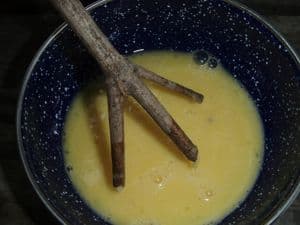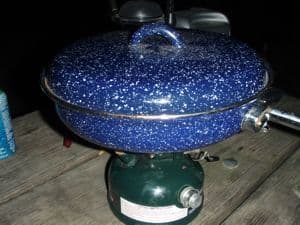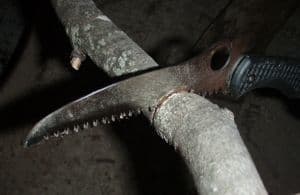Makeshift Camp Kitchen
Necessity being the Mother of Invention and all that, over the years I have had plenty of opportunity to call upon "Mom" to see me through a round of forgetfulness. Seems like it appears this time of year when the weather is such that good weekends arise out of nowhere and the decision to camp comes about two o'clock Friday afternoon.
So it was a couple of weeks ago when I hurriedly packed up for an overnight camping trip. Chicken stew for dinner, some French toast for breakfast and my meal plan was set. I rummaged through a kitchen gear pack and, seeing most of what I needed, I strapped it up and tossed it in the car.
Hardly is there an outing where we don’t forget some thing, some little contraption or device that, while not critical, it sure would have been handy. I find this most often happens with stuff for cooking. It’s like a can opener. Oh sure, you can tear open a can of tomatoes with your Swiss army knife. Of course your cooking area will look like a scene from Chainsaw Massacre IV – or that time you mixed up the Bloody Mary’s without putting the lid on the blender.
Perhaps the example above is not the best – it’s probably impossible to devise a makeshift can opener from a natural box of tools. I suppose one could smash the can with a rock and sop up the sauce. My purpose here is to share some simple, but workable solutions to common challenges in camp, mostly when it comes to cooking, and most often when a piece of gear designed for a particular purpose has been left at home.
Camp Whisk or Egg Beater This is fashioned from a twin-forked branch slightly larger than a pencil. The twin fork enables you to carve the three extensions are preferred for the assigned task – they work much more effectively than just two. When held vertical, and spun by sliding the palms back and forth against its vertical axis, those three fingers create enough "turbulence" to fluff an egg white. Not that a whisk is a common camp kitchen tool, one does come in handy for certain meals.

Skillet vs. Pot Continuing on the subject of cooking, sometimes we don’t bring all the pots we should, thinking we can conserve space by doubling up on use. That being said, do you skip the fry pan and cook pancakes in a pot or do you serve up the oatmeal in a frying pan? Probably neither, since both are basic and somewhat crucial to 90% of the cooking done in camp. Even though I never drink coffee, a sturdy coffee pot is a basic tool for keeping a supply of heated water in the ready around my camp.

When you do forget one or the other, then a Plan B is needed. Can one pan replace the other and still get the job done. I have found that it is generally easier to answer positive when you have the skillet and forgot the pot. The advantage to the skillet is that it seems to heat things faster. The down side is that it doesn’t hold very much liquid – and the amount it does hold tends to slosh around a lot. Still for a makeshift vessel for pre-made stews and such, a frying pan (especially one with a lid to help steam heat) can come to the rescue.
Knife-Saw
Sometimes its not so much forgetting a tool, it’s deciding that its use is so limited that you question whether you should bring it at all. This a critical decision when weight and space are issues. I am thinking of the camp hatchet, versus axe versus saw as a tool. Hatchets and axes can be heavy; saws cumbersome unless they can be folded down to little more than a large knife in a sheath.

That’s exactly were I am going with this. A small knife-like saw is about all one needs for most trips – where smaller firewood and kindling are available. It’s not always that easy to chop hard, dry wood. Small pieces that are good for kindling starters or to kick a fire up a notch for cooking are often a little too thick or too hard to break over the knee. A small saw can notch the branch enough to create a "starter break" in the wood to the point that a dozen or so strokes weakens it enough to then break it in two. Axes are fine, big saws, too. Still, for many jobs, a mini-saw works just fine.
Joys of Goodwill
While we are on the subject of gadgets and tips for cooking, here’s a tip on a great place to find items to add to your arsenal of camp kitchen gadgets. Check your local Goodwill or ARC stores for some incredible kitchen finds. Remember, one man’s junk is another man’s treasure – and usually cheap and ideally suited for the camp kitchen.
Naturally the backpacker or minimalist paddler is not going to bring a full assembly of utensils out in the field. There a Swiss army knife and a "spork" are all the preparation/eating tools necessary. Weekend paddling trips, however, allows us to bring out the fuller range of needed utensils because now we have a limited opportunity to use griddles, and big pots and multi-course, multi-pot meals that we can carry out.
Check those stores for sets of silverware. Sometimes you can even gather up matching sets. There are typically drawers full of spoons, forks and knives selling for ten cents each – or less! Sometimes a tool might take on a new task in your kitchen. I have a couple of wok utensils that I bought for a staggering price of 29 cents each that will work perfectly for myriad uses around the kitchen or camp. I passed up ladles and scoops and squeezers and shakers and tongs and... a few gizmos I didn’t even recognize. The added joy of shopping these stores is that you may find a treasure you weren’t even looking for.
There are flexible pouches with pockets for storing and display these tools. You can also get plenty of cooking utensils into a small plastic snap lid container, too. Even a one-pot meal may cause you to recruit some tools for its preparation, so don’t sell a well-equipped beach or camp kitchen short.
It’s possible to cook an entire multi-course meal using only natural tools made or found on a beach. However, having the right tools or improvising enough that you can play with your food a bit can make camp cooking a very rewarding experience – even before your first mouthful.
Tom Watson is an avid sea kayaker and freelance writer.
His latest book, "Kids Gone Paddlin" is available on Amazon.com.
He is also the author of "How to Think Like A Survivor"
Related Articles
I've been busy lately rearranging my cooking essentials: the little tools that I can't do without. Of…
Mark Twain once described the Mississippi River as being "too thick to swim it and too thin to plow!"…
In 1971, I outfitted and guided three wealthy Chicago men--the least affluent of which earned a quarter…
Drying is probably the most ancient way to preserve food for a very long period of time. You have…


